Related Research Articles

Precision agriculture (PA) is a farming management strategy based on observing, measuring and responding to temporal and spatial variability to improve agricultural production sustainability. It is used in both crop and livestock production. Precision agriculture often employs technologies to automate agricultural operations, improving their diagnosis, decision-making or performing. The goal of precision agriculture research is to define a decision support system for whole farm management with the goal of optimizing returns on inputs while preserving resources.

Helen Greiner is a co-founder of iRobot and former CEO of CyPhy Work, Inc., a start-up company specializing in small multi-rotor drones for the consumer, commercial and military markets. Ms Greiner is currently the CEO of Tertill Corporation.

Jane Poynter is an American aerospace executive, author and speaker. She is founder, co-CEO and CXO of Space Perspective, a luxury space travel company. She was co-founder and former CEO of World View Enterprises, a private near-space exploration and technology company headquartered in Tucson, Arizona. Poynter was also a founding member of the Biosphere 2 design team and a crew member from the original two-year mission inside the materially closed ecological system.

An unmanned surface vehicle, unmanned surface vessel or uncrewed surface vessel (USV), colloquially called a drone boat, drone ship or sea drone, is a boat or ship that operates on the surface of the water without a crew. USVs operate with various levels of autonomy, from remote control to fully autonomous surface vehicles (ASV).

Genevieve Bell is the Vice-Chancellor of the Australian National University and an Australian cultural anthropologist. She is best known for her work at the intersection of cultural practice research and technological development, and for being an industry pioneer of the user experience field. Bell was the inaugural director of the Autonomy, Agency and Assurance Innovation Institute (3Ai), which was co-founded by the Australian National University (ANU) and CSIRO’s Data61, and a Distinguished Professor of the ANU College of Engineering, Computing and Cybernetics. From 2021 to December 2023, she was the inaugural Director of the new ANU School of Cybernetics. She also holds the university's Florence Violet McKenzie Chair, and is the first SRI International Engelbart Distinguished Fellow. Bell is also a Senior Fellow and Vice President at Intel. She is widely published, and holds 13 patents.

Gwynne Shotwell is an American businesswoman and engineer. She is the president and chief operating officer of SpaceX, an American space transportation company, where she is responsible for day-to-day operations and company growth.
Esra'a Al Shafei is a Bahraini civil rights activist, blogger, and the founder and executive director of Majal and its related projects, including CrowdVoice.org. Al Shafei is a senior TED Fellow, an Echoing Green fellow, and has been referred to by CNN reporter George Webster as "An outspoken defender of free speech". She has been featured in Fast Company magazine as one of the "100 Most Creative People in Business." In 2011, The Daily Beast listed Al Shafei as one of the 17 bravest bloggers worldwide. She is also a promoter of music as a means of social change, and founded Mideast Tunes, which is currently the largest platform for underground musicians in the Middle East and North Africa.
Marita Cheng is the founder of Robogals. She was named the 2012 Young Australian of the Year. She is the founder and current CEO of Aubot, a start-up robotics company. She co-founded Aipoly, an app to assist blind people to recognise objects using their mobile phones. She was named as one of the World's Top 50 women in Technology by Forbes in 2018 and was recognized on the Forbes 30 Under 30 list in 2016. On 9 June 2019, Cheng was appointed a member of the Order of Australia for significant service to science and technology, particularly to robotics.

Jennifer Robinson is an Australian human rights lawyer and barrister with Doughty Street Chambers in London.
Anastasia Taylor-Lind is an English/Swedish photojournalist. She works for leading editorial publications globally on issues relating to women, population and war. She has lived in Damascus, Beirut, Kiev and New York City and is now based in London. As a photographic storyteller, Taylor-Lind's work has focused on long-form narrative reportage for monthly magazines.
Kate Raynes-Goldie is a Canadian-New Zealand designer, writer, speaker, cultural anthropologist and certified Lego Serious Play facilitator known for her work on play and games for human connection, creativity and innovation. She is a regular media commentator, appearing on MTV, NPR and in the Australian Financial Review and Elle. She has a monthly innovation column in the Business News, and is a regular contributor to Scitech's science and technology publication, Particle. Raynes-Goldie was the first Director of Interactive Programs at FTI and a past Senior Adjunct Research Fellow at Curtin University.
Professor Adam Beaumont DL is a businessman, angel investor, trustee and digital entrepreneur. He is the CEO of telecommunications provider aql, a visiting professor of cyber security at the University of Leeds and the Honorary Consul of the Republic of Estonia to the Northern Powerhouse and the Isle of Man.

Joy Adowaa Buolamwini is a Canadian-American computer scientist and digital activist formerly based at the MIT Media Lab. She founded the Algorithmic Justice League (AJL), an organization that works to challenge bias in decision-making software, using art, advocacy, and research to highlight the social implications and harms of artificial intelligence (AI).

Sarah bint Yousef Al Amiri is the Minister of State for Public Education and Advanced Technology and Chair of the Board of Directors of the Emirates Schools Establishment. She is the former Minister of State for Advanced Technology within the Ministry of Industry and Advanced Technology in the government of the United Arab Emirates. Al Amiri is also the chair of the UAE Space Agency and the United Arab Emirates Council of Scientists, and Deputy Project Manager of the Emirates Mars Mission.

Zipline International Inc. is an American company that designs, manufactures, and operates delivery drones. The company operates distribution centers in Rwanda, Ghana, Japan, the United States, Nigeria, Cote d'Ivoire, and Kenya. As of April 2024, its drones have made more than one million commercial deliveries and flown more than 70 million autonomous miles.

Jeong Eun-kyeong or Jung Eun-kyeong is a South Korean infectious disease and public health expert served as the first Commissioner of KDCA, Korea Disease Control and Prevention Agency, from 2020 to 2022. Jeong was previously the first woman to lead its preceding agency, KCDC, which history dates back to 1981.
Maksym "Max" Polyakov is an international technology entrepreneur, investor, economist, and philanthropist. Polyakov is a general partner in the venture fund Noosphere Ventures Partners LP which invests in a number of technology companies over the global scale.
Gamaya is a Swiss company which provides drones equipped with hyper-spectral cameras for use in agriculture.
Jamila Gordon is a Somali Australian entrepreneur. She is the CEO and founder of an Australian SaaS company applying AI and Blockchain to food supply channels (Lumachain). After escaping the Somalian Civil War at the age of eighteen, she was a displaced person in Kenya before moving to Australia, where she received a degree in IT from the La Trobe University. Gordon later served as the CIO at Qantas and Leighton Holdings/CIMIC, and as an executive at IBM. She was subsequently named as Microsoft's Global Awardee in the International Women's Entrepreneurship Challenge 2018, Australia & New Zealand Innovator of the Year in the Women in AI Awards 2020, NSW Pearcey Entrepreneur of the Year 2021. She was recognized as one of the BBC's 100 women of 2021.

In February 2022, two days after Russia's full-scale invasion, Ukraine requested American aerospace company SpaceX to activate their Starlink satellite internet service in the country to replace internet and communication networks degraded or destroyed during the war. Starlink has since been used by Ukrainian civilians, government and military. The satellite service has served for humanitarian purposes, as well as defense and attacks on Russian positions.
References
- 1 2 "Ukrainian woman is among the top 100 influential and inspiring women from around the world for 2020". AIN.UA. 25 November 2020. Retrieved 26 November 2020.
- ↑ "FluroSat Scores $3.2m Seed Funding Co-Led by Microsoft's M12". AgFunderNews. 22 July 2019. Retrieved 26 November 2020.
- ↑ "FluroSat Acquires ProductionWise from Australia's GrainGrowers". AgFunderNews. 6 November 2018. Retrieved 26 November 2020.
- ↑ "Engineer Anastasia Volkova is getting the agtech industry airborne". Create. 31 December 2018. Retrieved 27 November 2020.
- ↑ "The Drones that Grow Our Food | Anastasia Volkova". TEDxSydney. Retrieved 14 December 2020.
- ↑ "Anastasia Volkova". MIT Technology Review. Retrieved 26 November 2020.
- ↑ "BBC 100 Women 2020: Who is on the list this year?". BBC News. 23 November 2020. Retrieved 26 November 2020.
- ↑ "Gro's CEO Discusses the Global Food Crisis at the Bloomberg New Economy Forum". Gro Intelligence. Retrieved 29 January 2024.
- ↑ "Aussie founder raises $50m while rescuing her mum from Ukraine". Australian Financial Review. 23 May 2022. Retrieved 29 January 2024.
- ↑ Volkova, Anastasia. "Council Post: Data's Role In Helping The Agricultural Industry Adapt To A Warming Climate". Forbes. Retrieved 29 January 2024.
- ↑ "The Bloomberg New Economy Catalyst List". Bloomberg.com. Retrieved 29 January 2024.